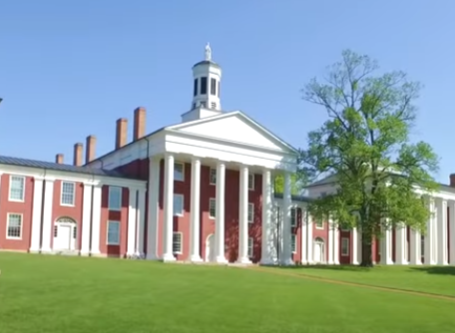Liberal colleges find alumni want free speech

There is a donor-led rebellion against progressive and left-wing indoctrination on college campuses, and it is spurred by alumni dedicated to defending free speech at their alma mater.
According to the Wall Street Journal, liberal colleges and universities have fun into significant opposition from prominent and wealthy donors when it comes to free speech protections. Instead of a cash cow, these institutions have run into a gamut of opposition regarding the lack of free speech protections on college campuses.
One example is Cornell University alum Carl Neuss. Neuss, who graduated from the Ivy League institution in 1976, is a California real estate developer. He had regularly donated seven-figure contributions to his alma mater until two years ago in 2020.
When Cornell contacted Neuss, he held off on donating to the school until his concerns about progressive groupthink and ideological repression were resolved. When put into contact with politically moderate professors, they revealed to him that they felt humiliated by mandatory diversity training and they were constantly worried about saying something potentially offensive.
As Neuss said, these professors felt that if they said the “wrong words,” they could lose their jobs or “be shunned.”
In response, the university said, “robust debate and a discussion of all views remain hallmarks of the Cornell experience both in and out of the classroom.” Yet the statement does not acknowledge how a robust debate could turn into an ideologically-driven political witch hunt within college campuses and its departments.
Neuss ended up contributing to the start of a dissident alumni group called Cornell Free Speech Alliance. Such groups are one outlet for dissatisfied alumni to voice their concerns to their alma mater. The Wall Street Journal estimated that there are around 20 such groups that are applying pressure to administrators to protect and ensure free speech on college campuses. Most of the groups’ participants come from a politically moderate or conservative background, graduated from college between the 1960s-1970s, and are primarily concerned about the left-wing and progressive groupthink, lack of ideological diversity, and faltering free speech protections.
There is also a similar movement at the private Virginia college known as Washington and Lee University. The free speech group Generals Redoubt organized in 2018 because donors and alumni believed that the school was beginning to move towards revoking its namesakes from the institution. U.S. President George Washington’s role was that he endowed the school while Confederate General Robert E. Lee served as president of the school after the U.S. Civil War. Meanwhile, progressive activist students have openly condemned the school’s namesakes over slavery as both men owned slaves.
Generals Redoubt said that it sent out over 10,000 emails asking for alumni to “suspend contributions” until the university properly assures its alumni that no changes will occur regarding its namesakes. Jay Fant, who leads the roughly-12,000-member group, told the Journal, “We see ourselves as a voice for students, so they can speak freely on campus.”
Right on cue, Washington and Lee President Will Dudley said that it was unfair to put his university, and universities in general, in the middle of political crossfire. “We’re living in an environment where people on both sides, right and left, are engaged in a culture war and they want to use universities,” Dudley claimed, “I don’t find that beneficial to our mission and I’m not interested in being a participant in it.”
But Dudley did not directly address the concerns expressed by Generals Redoubt in his statement, which is not reassuring to donors and alumni.
At Davidson College, a private North Carolina college, John Craig heads the Davidsonians for Freedom of Thought and Discourse to rebut the stranglehold of progressive ideology on his alma mater. He told the Journal, “This is a battle for our culture and, in many ways, for Western civilization.” Craig added, “Open and free expression is what makes our country great, and if we lose this, our country is in deep trouble.”
Craig helped start the group in 2019 because he heard from students and faculty about how they were becoming increasingly uncomfortable expressing their opinions in class out of fear of shaming, receiving bad grades, or worse.
Interestingly, Craig’s group at Davidson commissioned a survey of donors about their attitudes on free speech. A resounding 94% said the next president of Davidson should make both free speech protections and civil discourse a priority.
Davidson’s president, Carol Quillen, was quoted as saying, “A little intellectual humility is not bad thing.” She made the point that students often guard their remarks and opinions due to increased diversity among the student body.
But Quillen does not acknowledge that a fear of shaming or humiliation drives a lot of the self-censorship among students on college campuses today.
For example, a 2022 survey from RealClear Education and other partners found that over 80% of college students self-censor some of the time while on campus. The survey discovered other worrying trends, such as that 66% of students felt it was acceptable to shout down a speaker to prevent a public speech, 23% believed that violence was acceptable to stop a campus speech, and over 50% thought that racial inequality was a difficult issue to discuss with their peers.
How does this donor-led rebellion affect universities?
According to the Council for Advancement and Support of Education, higher education institutions raised almost $50 billion from outside sources, $11 million of which came from alumni. Also, donations compose 19% of the budget spent on students at private non-profit institutions, but only 8% at public institutions.
Overall, college and university presidents quoted by the Journal hedged when asked about protecting free speech, which is a telling statement in itself. It demonstrates how administrators are fearful of the activist and progressive student body and faculty, rather than dedicated to protecting the First Amendment on their campuses.




